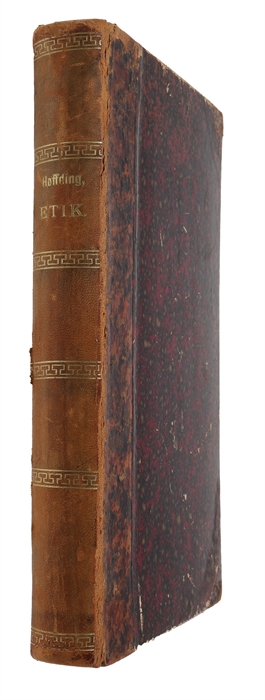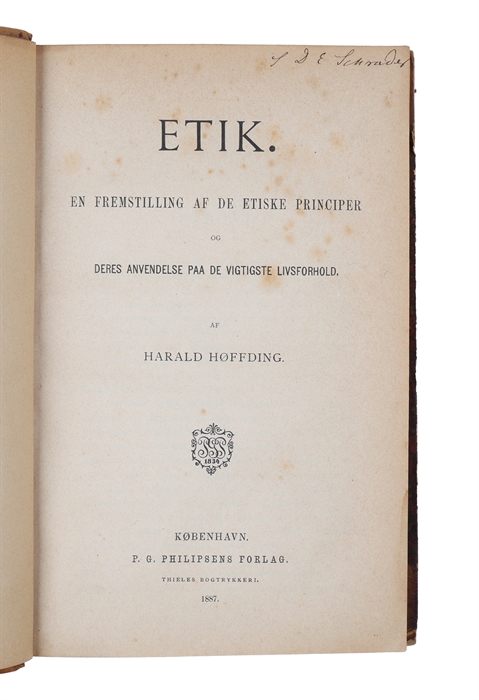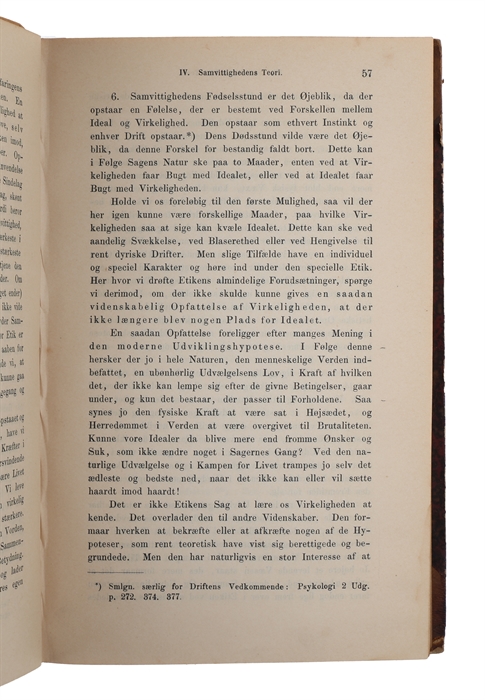THE FOUNDATION OF THE WELFARE-STATE
HØFFDING, HARALD.
Etik. En Fremstilling af de etiske Principper og deres Anvendelse på de vigtigste Livsforhold.
København (Copenhagen), Philipsens Forlag, 1887.
Lex8vo. Contemporary brown half calf with gilt ornamentation to spine. Spine worn, mostly at hinges and capitals, but binding fine and tight. Corners and edges with wear. First quire brownspitted, otherwise ownly light occasional, scattered brownspotting. Old owners' names to front free end-paper and to top of title-page respectively. (6), VIII, 417, (1) pp.
Scarce first edition of the work in which a welfare principle is presented for the first time, laying the groundwork for the welfare state as we know it today. Høffding’s “Ethics” came to have a profound impact upon European politics and philosophical ethics of the Positivist era and directly influenced the development of the Scandinavian welfare state. “[I]t was Høffding who was the first in the world to work out a welfare-principle, namely in his “Etik” (Ethics) in 1887. Today, Høffding is not widely known, but in his lifetime and up to the 1950ties he was an internationally famous philosopher, whose works were translated into many languages and who was several times nominated for the Nobel Prize.” (Andersen, A.T.: The Dialogic and Religious Theme of Welfare in Harald Høffding…, p. 104). “Etik” constitutes an ethical system. Høffding discusses the principal questions in order to develop a scientific ethics, or a moral science if one will, analyzes the ethical principles that are expressed in ethical assessments, and on the basis hereof develops an individualistic and a social ethic that was way ahead of its time, but which found great resonance within the reading public. The book had an enormous impact. It appeared five times in Høffding’s life-time, sold extremely well, and was quickly translated into German and French – “Denmark had gotten its first internationally known and acknowledged philosopher, several decades before Kierkegaard had his breakthrough on the international scene.” (Koch, Dansk filosofi i positivisments tidsalder, p. 41 – translated from Danish). “Høffding became a mentor to many – not least because of the humanity that marks this book [i.e. Ethics] and because of the well-balanced treatment it gives of the social and political questions of the time, of the relationship between the sexes and between church and state, just to mention a few of the “important life conditions” it deals with. Students in personal crisis contacted him, and people in difficult circumstances wrote to him for advice. Not least because of his ethical view, he came to appear as the old, wise man of the nation… His influence in the neighboring countries was also great. For instance, his ethical considerations in the years around 1900 came to play a significant role for the young Swedish social democrats and for their conception of a coming welfare state.” (Koch, Dansk filosofi i positivisments tidsalder, p. 60 – translated from Danish). “Harald Høffding, the Danish philosopher and historian of philosophy, was born in Copenhagen and lived there throughout his life. From 1883 to 1915 he was professor of philosophy at the University of Copenhagen. Høffding received a degree in divinity in 1865, but he had already decided not to take orders. A study of Søren Kierkegaard's works, and especially of his views on Christianity, had led to an intense religious crisis ending in a radical break with Christianity. Høffding sought in philosophy a new personal orientation and gradually developed into an extraordinarily many-sided liberal humanist. His philosophical development was influenced during a stay in Paris (1868–1869) by the study of French and English positivism… his activity as a scholar ranged over every branch of philosophy, including psychology. His works display a vast knowledge, a keen eye for essentials, and a critically balanced judgment. They were translated into many languages and widely used as textbooks. By the turn of the twentieth century Høffding's reputation was worldwide and he knew personally many leading thinkers. He was the outstanding Danish philosopher of his day, and in 1914 the Royal Danish Academy of Sciences and Letters assigned him the honorary residence of Gammel Carlsberg, where he lived to the end of his life. The residence later passed to the physicist Niels Bohr, a younger friend of Høffding.” (Frithiof Brandt, Encyclopaedia of Philosophy). “The Danish philosopher Harald Høffding was the first in the world to work out a welfare-principle. He expressed a dialogic and democratic standpoint, a fellowship and an ideal concerning equality, and consequently a distinct philosophical basis for the realization of the formation of the welfare state.” (Andersen, A.T.: The Dialogic and Religious Theme of Welfare in Harald Høffding…, p. (103).).
Order-nr.: 62629



